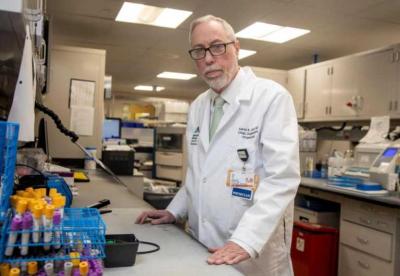Below is an update on the Covid situation from Rav Dr. Aaron Glatt, RAA/Igud's Director of Halacha and Medicine Commision, dated July 9, 2020 (the situation changes day to day). He will provide a live update on Motzei Shabbos, July 11 at 9:45pm NY time
Zoom dial-in:
Meeting ID: 980 3243 6809
Password: SUMMER2020
or by phone: +1 929 205 6099 US
COVID-19 UPDATE: July 2nd
I am happy to report that we have NOT seen significant complications or outbreaks from our new cases of COVID-19 in the Five Towns. Boruch Hashem.
While Woodmere alone saw a dozen new cases in the first week of July, and the other “Four” Towns and surrounding neighborhoods reported new COVID-19 as well, and there are new cases in other Jewish communities, Boruch Hashem at this time so far those cases have NOT translated to larger outbreaks or hospitalizations. We obviously continue to watch this very closely, because the situation elsewhere in the US and in Israel continues to get much worse.
Why have we been fortunate to date to not see additional outbreaks, while so many other states, Israel and countries worldwide have huge problems? While this answer is crucial to know, we unfortunately, do not have a clear explanation, which is very disconcerting.
With camps underway, semachot and travel occurring, and Nassau County in Phase 4 (which opens up more indoor and outdoor entertainment and shopping) we must be very wary of a perfect storm. People must continue to wear face coverings and practice social distancing at all sites. Essentially what has changed is just where you can go - but not what you must do.
I will address this and other questions at our 9:45 motzei Shabbos zoom: Meeting ID 980 3243 6809; use this new Password: SUMMER2020; by phone: 929 205 6099 or via YouTube link obtainable from yiwoodmerecovidupdate@gmail.com.
What are all the rumors flying around about the same individual getting COVID-19 a second time?
I have previously stated many times that there still has not been even a single case published of a second bout of COVID-19 in the same person, and I believe that still to be true. However, a respected Queens pediatrician who listened to last week’s talk sent me an unpublished detailed case report of a COVID-19 patient who had and then lost their IgM antibodies (which reflects new infection), got IgG antibodies (suggesting immunity), and subsequently underwent 6 negative COVID-19 tests. They became exposed weeks later to an active COVID-19 patient, and they re-acquired IgM in their blood and tested positive for COVID-19, indicative of a second COVID-19 event.
This might be just what we have been so concerned about – someone with COVID-19, who recovered fully, developed IgG antibodies, yet getting COVID-19 a second time and potentially being able to transmit it to others. Fortunately, this person did not exhibit any symptoms the second time and it is unknown therefore what this case truly represents. I have heard from a Brooklyn pediatrician of 2 other similar reports as well, and these are being evaluated by the NYC DOH. This information if accurate will be a game changer. If indeed real, the true long term benefit of antibodies will certainly be questioned. The frequency, severity of illness and likelihood of transmission all remain totally unknown at this time. Much more to come.
What other new information was published this week?
1) A study published in the American Journal of Gastroenterology showed an increased risk for COVID-19 in people on proton pump inhibitors (“PPIs”), a very commonly used class of drugs that people take for control of acid reflux. This was especially true for patients taking them twice daily. PPIs should only be used when clinically indicated and then only at the lowest effective dose. An elevated risk was not seen among patients who took histamine antagonists, another commonly used ulcer medication.
This study does not mean that people on PPIs should stop their medication. However, good sense dictates that one should only take these drugs if really necessary, and / or lower the dose if possible.
2) A brief report in Clinical Infectious Diseases again showed another interleukin inhibitor, baricitinib, to be of value in a small group of COVID-19 patients. The body’s hyperinflammatory response to COVID-19, the so called “cytokine storm” has been associated with increased mortality in COVID-19. Once again, promising results from immunosuppressive agents, but more data are needed.
3) Hydroxychloroquine (HCQ) - the drug that just will not die - made a slight comeback this week with a multi-hospital Detroit study published in the International Journal of Infectious Diseases, suggesting HCQ might indeed have some benefit if used early in patients with COVID-19. The authors concluded that when controlling for COVID-19 risk factors, treatment with HCQ alone and in combination with azithromycin was associated with reduction in COVID-19 associated mortality. Why all the conflicting data – why can’t we get this right?
The answer sadly is that we as a medical community have just not done our homework to properly evaluate a medication’s efficacy. There is such a clamor for treatment and such a high mortality in untreated patients that no one is willing to wait to test a study medication properly. Everyone wants access to the “best treatment” no matter that it is unproven. This has led to many well-meaning but poorly controlled attempts to evaluate these medications.
Bottom line: Prospective randomized double-blind trials are needed to assess new treatments. Similar to reports of second episodes of COVID-19, we need real data to make proper decisions. This was true in the times of the Rambam as he posited in his commentary to the Mishnah in Yoma and is even more true today.
4) For the first time, the FDA publicly warned of false positive COVID-19 tests. There is an increased risk of false positive results from the BD SARS-CoV-2 Reagents for the BD Max System test, with the manufacturer reporting approximately 3% of results were false positives. The agency recommends clinical laboratory staff and health care providers consider presumptive any positive result from tests using the BD SARS-CoV-2 Reagents for the BD Max System and confirm results using an alternate, authorized test. I do not know how many laboratories or local physicians use this system, but we now need to be concerned that we are inaccurately telling people they have COVID-19.
What is going on with COVID-19 mutations?
A major publication in the journal Cell described several COVID-19 variants or mutations. In general, COVID-19 has a much lower mutation rate than viruses like influenza and HIV. The authors reported that there appears to be a set of four linked mutations - with differences in an amino acid that makes up the COVID-19 spike protein - that appear to have arisen and moved together around the world as a consistent set of COVID-19 variations. Unfortunately, they noted that these mutations seem to result in an increase in infectivity but fortunately, not a corresponding increase in the severity of illness.
Anthony Fauci, director of the National Institute for Allergy and Infectious Disease, said during an online event hosted by the Journal of the American Medical Association, that “there is some dispute about the findings, which stem from an in vitro examination of the mutations, and it’s not clear whether people who become infected with a newer variation of the pathogen fare worse than those with the original strain.” The Gates Foundation-supported Coronavirus Immunotherapy Consortium leadership noted: “These findings suggest that the newer form of the virus may be even more readily transmitted than the original form – whether or not that conclusion is ultimately confirmed, it highlights the value of what were already good ideas: to wear masks and to maintain social distancing.”
Have these mutations or changes in incidence impacted mortality??
While the virus shows little sign of diminishing in most states, and many countries across the world, the virus has had a decrease in mortality per case in the US. In April and May, Covid-19 caused ~ 3,000 deaths / day, with an approximate overall 7 - 8 % mortality, versus the current ~ 5% mortality figure. Clearly there are numerous factors involved, although no evidence exists that the virus is less potent. The downward mortality trend is probably multifactorial, with increased testing of asymptomatic patients (much lower likelihood of death a priori), better and earlier treatment plus a shift in infections to the younger population versus the older adults. The relative contribution of these factors is not yet clear, and I will discuss these ramifications more motzei Shabbos.
The three weeks is a dangerous time in the calendar for Klal Yisroel.
May Hashem spare us additional tragedies. May the Beis Hamikdash be speedily rebuilt in our times!
Have a great Shabbos.















